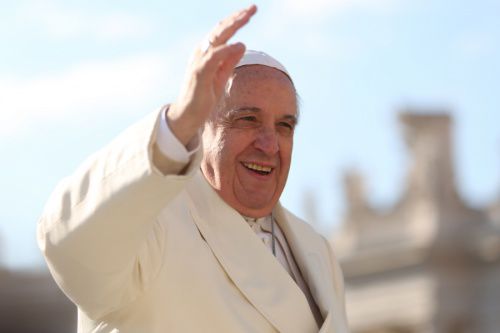Pope Francis has encouraged workers not to blame their economic troubles on migrants, who are themselves often victims of injustice and treated like merchandise rather than human beings. “Immigration increases competition, but migrants are not to blame, because they too are victims of inequality, of this economy of waste and of war,” the Pope said, remarking on the various crises, especially in Africa and the Middle East, which have driven migrants to Italy’s shores in droves. “It makes you cry to see the spectacle during these days in which human beings are treated like merchandise,” he added in off-the-cuff remarks. The pontiff’s remarks came during a meeting with workers, farmers, and entrepreneurs in the northern city of Turin’s Piazzetta Reale. The meeting was the first stop in his two-day visit. “My visit to Turin begins with you,” Pope Francis told his audience as he reflected on the importance of work. “Work is necessary, not only for the economy, but for the human person, his dignity, his citizenship, and his social inclusion,” he said. The Pope expressed his particular closeness to young people who are unemployed, and to other workers in various sectors who are having difficulty moving forward. “Now is the time to reactivate solidarity between generations, to restore faith between young people and adults,” he said. The Pope also addressed the rights of women, who “carry the majority of the weight in caring for the houses, the children, and the elderly, (yet) are nonetheless discriminated against, even in work.” Pope Francis, after arriving in Turin early Sunday morning, met with the workers as the first stop on his trip. The pontiff observed that even Turin, Italy’s third largest economic center historically known for its manufacturing, has been affected by the economic crisis. “In this we are called to reaffirm the ‘no’ to an economy of waste,” which calls us to resign ourselves “to the exclusion of those who live in absolute poverty,” he said. Pope Francis called on the faithful to say “no” to the idolatry of money, “no” to corruption, and “no” to inequality which, he said, “generates violence.” The complexity of the current global situation is such that it is not enough for “recovery,” the Pope said. There needs to be an “economic model” that is organized, above all, toward the common good, not merely as a function of capital and production. “Turin is called to be once again the protagonist of a new season of economic and social development with its tradition of manufacturing and craftsmanship,” as well as its traditions of research and innovation, the pontiff added. He also addressed the need for a “social and generational pact,” and the need to open new possibilities through support and education. Pope Francis cited the example of Saint John Bosco, the Turin saint whose 200th birthday is being celebrated this year. He was known for his social action to help young people. He founded the Salesians to educate the impoverished young and prepare them for occupations. “Don Bosco teaches us that the best way is that of prevention: even social conflict must be prevented, and this is done with justice,” the Pope said.

